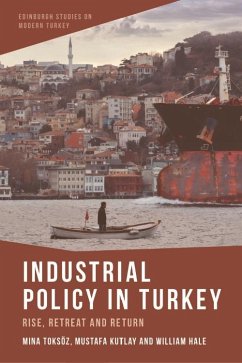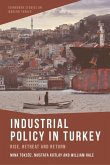Examines the evolution of Turkey's industrial policies in a global context over the last century
- Gives a conceptual review of the major debates on industrial policy and its evolution in Turkey that have closely followed international trends
- Documents Turkey's industrial policies over the last century to analyse continuity and change in its industrialisation performance
- Traces the evolution of industrial policies and the resulting changes in industrial structure to assess the impact of these policies
- Highlights differences between old and new industrial policies, with the tech-upgrade focus of the latter requiring higher skills and institutional capacity and the need to move beyond the old dichotomies such as import substitution vs export growth
- Draws on key indicators of public and private investment in manufacturing, the contribution of state enterprises, state banks' share of credit, the trends in state investment incentives, and various forms of on-and off-budget industrial incentives over time
At a time when many advanced and emerging economies are adopting more active industrial policies, this book provides an in-depth historical-empirical account of industrial policy in Turkey - its rise, retreat and return. This study adopts a multidisciplinary approach and covers the role of the state in Turkey's initial industrialisation to the current period of restructuring and potential technological upgrading of its manufacturing base. The analysis traces how industrial policy has been shaped by state capacity, the waves of reforms following economic crises, the dearth of long-term finance for industrialisation and, more recently, the need to address issues such as low-tech industrial structure and pre-mature de-industrialisation.
The authors argue that industrial policy is not a choice but a necessity for late developers to achieve structural transformation, and also that success is difficult and context-dependent with institutions playing a central role. They conclude that although the rise in protectionism and geo-economic conflicts is not as supportive as in the 1960s, the current global context creates opportunities for middle-income economies to implement effective industrial policy.
The argument draws on comparisons with other emerging economies, with a special focus on Brazil. It aims to answer questions of what worked and what went wrong with previous policies. It asks how current policies could be shaped to overcome the problems of cronyism and corruption, and also achieve new objectives of technological upgrading and socio-environmental sustainability. To this end, the book poses broader conceptual and empirical questions of relevance to all economies undertaking industrial policies today.
Dieser Download kann aus rechtlichen Gründen nur mit Rechnungsadresse in A, B, BG, CY, CZ, D, DK, EW, E, FIN, F, GR, HR, H, IRL, I, LT, L, LR, M, NL, PL, P, R, S, SLO, SK ausgeliefert werden.









